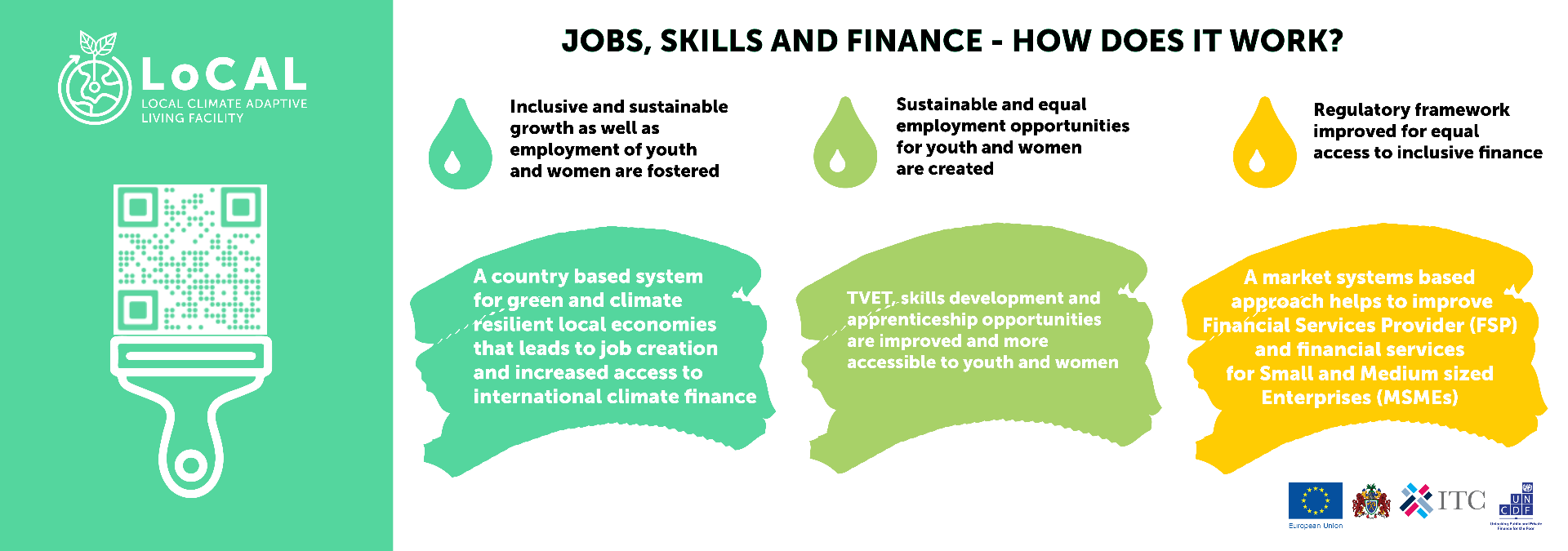
Adaptation investments get green light in The Gambia
20 projects were validated by the technical committee of the Jobs Skills and Finance programme last November, adding quality oversight and community participation to the LoCAL adaptation investments in The Gambia.
LoCAL is in a second phase in the Gambia, as it scales its efforts to provide climate grants, build capacities of local governments and communities to fulfill their green development agendas. LoCAL is currently moving in new areas of the country (see map) and uses a unique panoply of tools and methods to engage local governments and communities.

As part of continuous process of monitoring and evaluation, from 13-15 November 2020, the LoCAL technical committee organized a 3 days monitoring visit to the 8 JSF pilot project sites to make sure that the project activities are implemented the way they were described in the plan and to proceed to the review and validation of both the pilot and new work plans.
All the projects were selected and driven by the communities by using methods based on participation and inclusion. The projects illustrate the adverse challenges that communities faced and continue facing. These include challenges related to water scarcity, floods, health risks related to sanitation, water quality, accidents, and mobility of people and goods.
Many projects focused on integrated farming and forestry. Some target communities engaged in vegetable production such as tomatoes, cassava, bitter tomatoes, okra, eggplants. Others were engaged in reforestation by planting seedlings. In Wards such Bureng the communities prioritized the construction of road culverts to adapt to local impacts such as road erosion from floods. In the North Bank Region of the Gambia, Wards such as Darsalimeh, Kacthang and Prince chose water projects (Solar Power Borehole) as primary necessities given the hardship the communities were facing to fetch safe drinking water.
As the teams met with the communities, some remarkable interventions were highlighted such as projects that provided clean and drinkable water for the communities. These key adaptation actions helped to increase levels of health and hygiene and also importantly reduced the workload for women who used to cross the Gambian borders to get water in Senegal.
Flip our photos from the mission:
Photos 1 and 2
Photos 3 and 4
The mission headed by the Permanent Secretary of the Ministry of Lands, Regional government and Religious affairs enabled the committee to understand how the interventions is contributing in improving the lives and livelihoods of the beneficiary communities. Being the first of its kind, the mission involved meeting with Local Government Authorities, dignitaries from villages, the communities implementing the projects, meeting with cash for work beneficiaries. In the final day of the mission, all the 20 activity and investment plans were presented to the committee which gave them the opportunity to comprehend the rational behind each proposed project and to unanimously validate them.
Photo above - Front: the LoCAL technical committee comprised a myriad of relevant institutions: UNCDF, Ministry of Land, Regional government and Religious affairs, Ministry of environment, climate change and natural resources management, ministry of women and children’s affairs, Department of Forestry, Department of community Development, National Environment Agency, National Disaster Management Agency etc. Back: The women playing music and dancing to show their appreciation of the project and share with the LoCAL team.
What is the relevance of LoCAL for the JSF?
The EU funded Jobs Skills and Finance Programme (JSF) aims for the economic empowerement of youth and women creation of jobs and promotion of green growth in the Gambia. The initiative is three pronged (see diagram below). As the main instrument of its first component, LoCAL works to develop a country based system for green and climate resilient local economies that leads to job creation and increased access to international climate finance.

Watch the JSF Launching video for more information here:
The Gambia adds its voice to the Climate Dialogues:
Also this year, The Gambia was faced with the added challenge of COVID19. The global pandemic underlined the important role of local governments to curtail the impacts of the pandemic. Climate Adaptive actions in The Gambia provided much needed support to communities and helped them to ensure a resilient recovery. In communities such as Kaiaf Ward, Julafaar Ward and Gikoko ward, harvesting vegetables helped build community resilience in the face of CoVID-19: this allowed them to maintain nutrition levels in the community while increasing savings. Thanks to the vegetable gardening activities, women successfully sold a good part of their harvest - some saving as much as 4000 Dalasis.
The Gambia is also participating in the ongoing Climate dialogues and we are proud to feature below two videos from our Ambassador in the Gambia.
Watch our climate dialogue videos from The Gambia:
H.E. Hon Dibba
Minister of the Environment and LoCAL Ambassador, The Gambia
Salifuh Jaiteh
LoCAL and community development expert, The Gambia
These videos were produced as part of the LoCAL campaign for the Adaptation Week 2020, for the Climate Adaptation Summit and the lead up to COP26. You can help and add your voice to this campaign. Find out more, get all the links to connect with us below.
Stay connected with LoCAL
Join the LoCAL Network
Visit our site sections
Get LoCAL news in your mailbox
Enter your email below to subscribe to our newsletter

Stay Connected
GET THE LATEST UPDATES TO YOUR INBOX